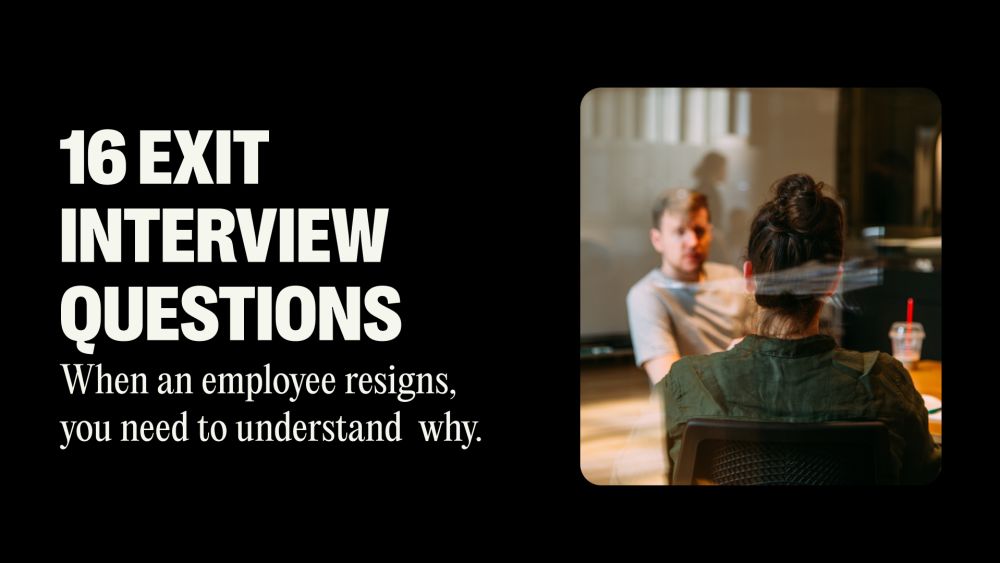16 Exit Interview Questions You Should Ask
In this article, we cover what exit interviews are, why you should do them, and our picks for the 16 best exit interview questions to ask departing employees.

In today’s talent shortage, retaining your top talent has never been more important. When an employee resigns, you need to understand why — and that’s where exit interviews come in.
An exit interview allows you to gain crucial insight into what you can do to improve the experience of working at your company and ensure that your company is a great place to work.
In this article, we’ll cover:
- What is an exit interview?
- The benefits of exit interviews
- Top 16 exit interview questions to ask departing employees
Let’s jump into it.
What is an exit interview?
An exit interview is a conversation between a departing employee — usually an employee who has resigned voluntarily — and a representative from the organization. The interview typically takes place on or near the employee’s last day of work and allows the two parties to exchange information. Most importantly, it provides an opportunity for the departing employee to share their reasons for leaving, as well as provide feedback about their experience working for the company.
The interview could take place face to face between the employee and a manager or HR. It could also be a written survey for the employee to fill out and return. We always recommend the first option — this allows for the most effective communication between your company and the departing employee.
Tip: An exit interview should be scheduled a week in advance. When scheduling, it’s a good idea to include a survey list of questions you’ll ask during the interview. This ensures that the employee has time to think about what they want to say, helping them feel more comfortable voicing their thoughts.
The benefits of exit interviews
Effective exit interviews can be a great way for your organization to collect open, honest feedback. Moving forward, this will help you improve your employees’ experience and ensure that your org is a great place to work.
Other benefits of conducting effective exit interviews include:
- Transparency. Before they leave, employees may have questions to ask for clarity and closure. An exit interview is a great way to provide transparency in the offboarding process.
- Leaving on good terms. It’s important to make sure that your employees depart on a positive note — especially considering the prevalence of boomerang employees in recent years.
- Private communication. Some employees may have concerns or frustrations they’d like to express before they leave. It’s crucial to give them an opportunity to do that. If you don’t, they may decide to air their grievances publicly instead. Not only is this bad for your employer brand — you’ll also miss out on important feedback that can help you improve the employee experience going forward.
- Ensuring an orderly departure. When an employee departs, there are a lot of practical things that need taking care of. An exit interview can help you ensure an orderly departure by wrapping up such things as equipment returns, intellectual property agreements, non-compete clauses, etc.
Top 16 exit interview questions to ask departing employees
An exit interview should take 30 minutes to an hour. This typically gives you time to go through 5-10 questions.
To help you prepare, we’ve compiled a list of our picks for the 16 best exit interview questions to ask departing employees:
- What prompted you to look for another job?
- In your opinion, did management adequately recognize your contributions during your time here? If not, how do you think recognition could be improved?
- Do you feel that you had the tools, resources, and working conditions needed to succeed in your role? If not, what could be improved, and how?
- Do you feel you had the necessary support to succeed in your role? If not, what would have been better?
- Did you feel comfortable talking to your manager?
- What was the most rewarding part of your job here?
- What was the most challenging part of your job?
- Do you feel that your job description changed since you were hired? If so, in what ways?
- What would you change about your job?
- What are you most looking forward to in your new job?
- Do you have any suggestions for how we would improve employee morale?
- What can the organization improve on?
- Do you feel that your job description changed since you were hired? If so, in what ways?
- What qualities do you think we should look for in a candidate to replace you?
- Would you consider returning to the company? If so, under what circumstances?
- Would you recommend working at our company to a friend? Why or why not?
Let’s get into it.
1. What prompted you to look for another job?
Everyone starts looking for another job for different reasons. This means that the answers you get to this question are likely unique to the individual employee. But over time, you might begin to detect common themes between answers — and that’s where you’ll get your important insights.
2. In your opinion, did management adequately recognize your contributions during your time here? If not, how do you think recognition could be improved?
Happy and engaged workers are key to a company’s success, and recognition is a crucial part of keeping employees motivated. This exit interview question can help you to prevent employees from feeling overlooked or taken for granted.
If the answer to this question is yes, ask the departing employee to talk about specific times they felt recognized and appreciated. This helps you identify which recognition methods are most effective.
3. Do you feel that you had the tools, resources, and working conditions needed to succeed in your role? If not, what could be improved, and how?
This exit interview question will help shed light on any workplace inadequacies you may not be aware of. Answers could range anywhere from lack of necessary training to uncomfortable workplace temperatures and outdated equipment.
4. Do you feel you had the necessary support to succeed in your role? If not, what would have been better?
Having the right support is crucial to feel comfortable in your job — regardless of the role. If the answer to this exit interview question is no and the departing employees give examples of areas to improve, take their suggestions to heart. After all, current employees may have the same complaints.
If the answer to the first part of this question is yes, ask what was particularly helpful — and make sure to promote these resources to your team.
5. Did you feel comfortable talking to your manager?
This exit interview question is useful in two ways. Firstly, you can use employees’ feedback to improve the performance and development of the manager who still works for your company. And secondly, you can use the information to help determine what to look for in a new employee for the team.
6. What was the most rewarding part of your job here?
Every employee will have a different answer to this question. Over time, however, you’ll start to notice similarities between answers. Use that information to promote the best aspects of the job in future job postings.
7. What was the most challenging part of your job?
Like the previous question, the answers you get to this question are unique to the individual employee, and you’ll likely have to ask it many times before similarities begin to emerge.
Once they do, look for ways to minimize the challenges employees may experience in the role. This will make the job more enjoyable for your future hires — and that makes them more likely to stay.
8. Do you feel that your job description changed since you were hired? If so, in what ways?
The demands of a job evolve over time, but the changes are often far more noticeable to the employee than to the managers. If departing employees point out discrepancies, use their input to update the job description before you start the hiring process. This way, you can be sure you’re looking for someone with the right skills to fill the opening.
9. What would you change about your job?
Jobs change over time, but some changes need to be implemented consciously. If the job itself was the reason the employee decided to leave, you need to ensure that your next hire isn’t entering into a volatile position. Listen to your employees’ feedback, and improve the position — this can help you avoid high turnover in the future.
10. What are you most looking forward to in your new job?
It’s always good to know what other companies are doing that you’re not. If the employee is leaving your company for another job, this question is your chance to learn if there’s anything you could work towards that would make future hires more likely to stay.
Is the employee excited about more flexible scheduling and a shorter commute? A higher salary and a better benefits package? Greater potential for career advancement? Their answers could tell you what you need to focus on moving forward.
11. Do you have any suggestions for how we could improve the employee experience??
The things you think improve the employee experience might not be what your employees are looking for. Employees often experience different sides of the company culture than you do, and they’re also far more likely to discuss morale among themselves than with their managers. Asking departing employees how to improve the employee experience could give you valuable insight and new ideas.
12. What can the organization improve on?
This general exit interview question is an opportunity for departing employees to share suggestions they didn’t bother making, or perhaps didn’t get the chance to share during their time with the company. You can further the discussion by inquiring more specifically about their level of satisfaction with various elements — e.g. assigned projects, the chain of command, the compensation package, and the company’s diversity, equity, and inclusion efforts.
13. What qualities do you think we should look for in a candidate to replace you?
It’s one thing to have the right skills to succeed in a role — it’s another to have the right qualities. The job may require certain soft skills, such as organization, patience, and people skills. Asking employees which key qualities to look for in their replacement can help you narrow down your search and ensure you find the right match for the job.
Need help preparing to recruit a replacement? Check out our 10-step guide to recruitment and hiring.
14. Would you consider returning to the company? If so, under what circumstances?
An employee may be leaving, but that doesn’t mean you’ll never see them again. If you part on good terms, they may become a boomerang employee — someone who later decides to come back to the company. With today’s talent shortage, you may be interested in keeping the door open for top performers who already know their way around your company.
Asking what it would take for departing employees to return can potentially help you get highly skilled professionals back on board. And even if they never reapply, you can still use their information to develop better employee retention strategies.
15. Would you recommend working at our company to a friend? Why or why not?
This exit interview question can help you determine if the employee’s reasons for leaving are personal, job related, or company related.
Ideally, the answer to this question is yes. This indicates that even if the employee was dissatisfied with certain aspects of their job, they remain positive about the company as a whole. However, if the answer is no, this is your chance to find out what would need to change for the employee to recommend your company as a workplace.
16. Is there anything else you would like to add?
Last, but not least, remember to give departing employees the opportunity to talk about things that haven’t come up. You may think your questions have covered everything, but there may still be positives or negatives that haven’t yet been discussed. This exit interview question gives the employee one last chance to speak their mind.
Wrapping up the interview
To conclude the exit interview, briefly review key points and ask for any clarifications you may need. Thank the departing employee for taking the time to talk to you, and wish them the best in their future endeavors.You should also use the end of the exit interview to recap any logistics or next steps required to complete the offboarding process.
Saying goodbye to top talent is never easy. However, with the information you’ve gathered from the exit interview, you can start working to improve what could be better, and to perfect what you’re already doing right. This can help you ensure that your org is the best place to work — for current, future, and boomerang employees alike.


The ORG helps
you hire great
candidates
Free to use – try today